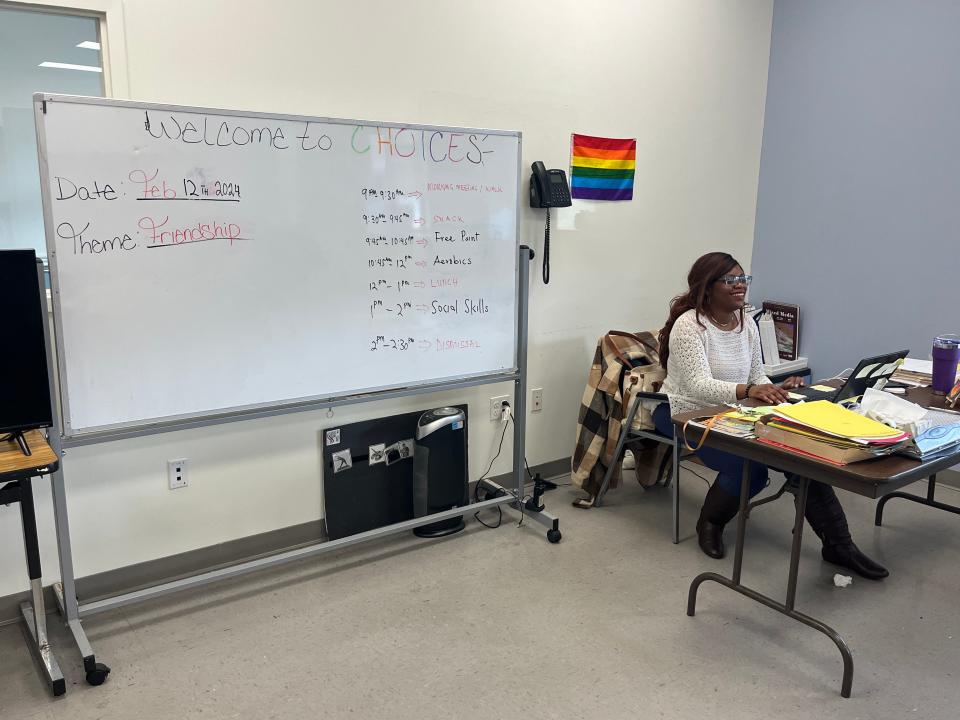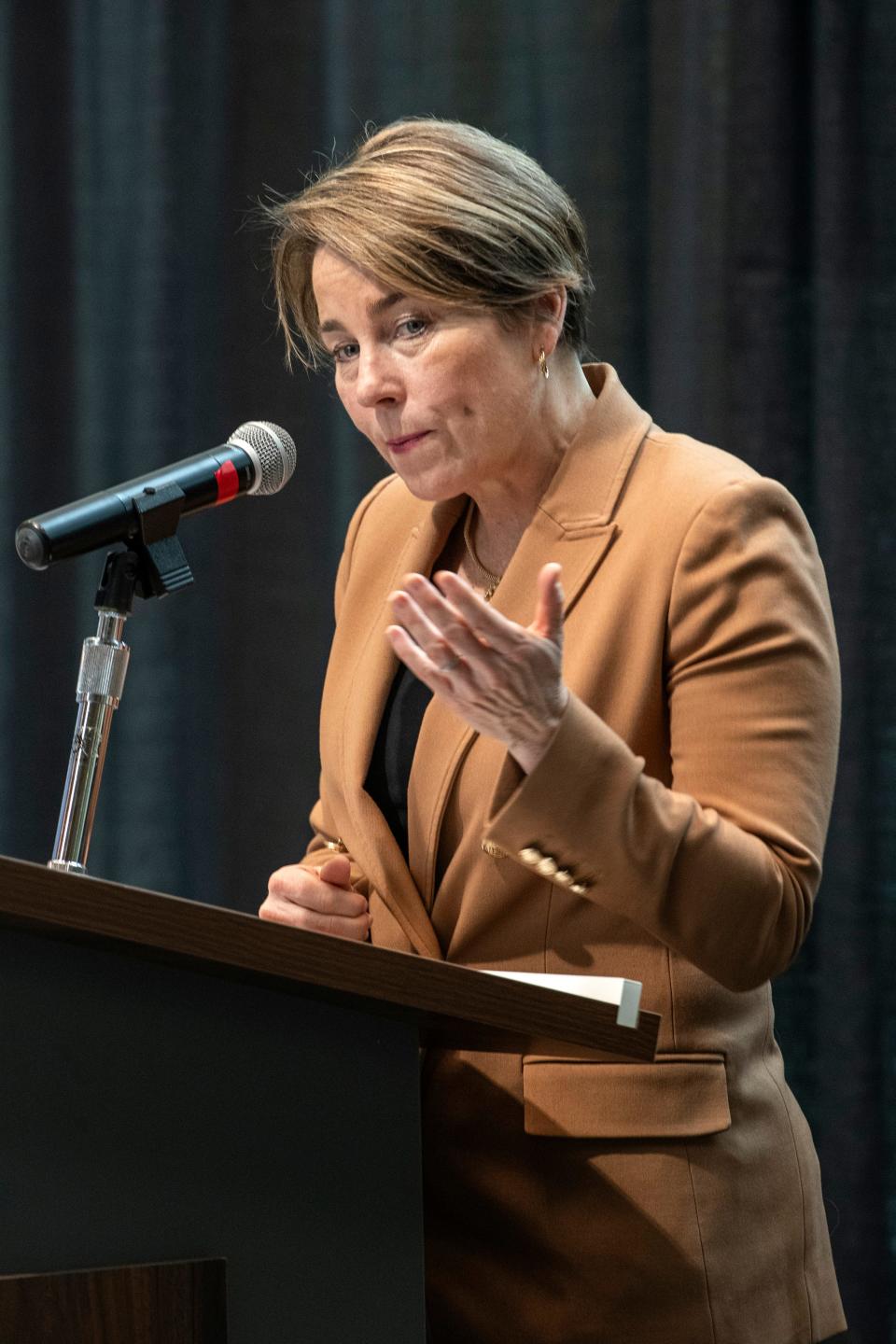Gov. Healey plans to increase spending on disability services. What it will be spent on
- Oops!Something went wrong.Please try again later.
ASHLAND — It was a typical Monday morning at Advocates Inc.'s Life & Skills Center on Eliot Street, which provides disability services to people with a wide range of needs and goals.
Some participants in the nonprofit’s Day and Employment program started their morning by practicing communication by socializing in a classroom setting. Others were on their way to gain resume-building skills through volunteer work. And still others had already found jobs in the community with the help of an Advocates job coach.
Stephen Robery, director of operations at Framingham-based Advocates Inc., said the center tailors support systems to help program participants pursue their goals for “a meaningful day and ultimately a meaningful life.”

“It gives them that sense of independence that they otherwise might not have,” he said. “It gives them a sense of purpose.”
But these individualized, flexible programs require a large number of highly trained employees, and the state has struggled to recover its disability care workforce since the pandemic.
Healey proposes more spending on helping disabled residents
Gov. Maura Healey’s proposed fiscal 2025 budget includes spending increases aimed at ensuring services like Advocates' day and employment program are fully staffed and available to disabled residents.
“The Healey-Driscoll administration prioritizes providing essential health and safety net services to all in Massachusetts, but especially for a population with unique challenges,” according to an email from the Massachusetts Executive Office of Health and Human Services to the Daily News. “These investments reflect the trends, challenges and needs of a diverse population with varied disabilities, from physical to intellectual.”
The governor’s budget sets aside almost 70% more funding to pay nonprofit and private organizations to provide care — including disability services like Advocates' day and employment program — to residents then it did two years ago. The state adjusts how much it pays providers for specific human service programs every other year.
The EOHHS is still holding hearings to determine how much it will reimburse disability program providers, but the governor’s budget would significantly increase what the state is permitted to spend.
Advocates official says more funds needed to adequately pay disability care employees
Advocates Senior Vice President fior Strategic Planning Jeffery Keilson said that money is primarily necessary to improve salaries for disability care employees who work directly with clients.
“They’re a social worker, they’re a nurse — they do a lot,” he said. “They're the backbone of providing high-quality services.”

'Mental health is critical issue': Framingham's Advocates opens community behavioral health center
Disability service providers in Massachusetts have struggled to retain staff and fill open positions since the pandemic, according to a spring 2023 survey by the Framingham-based Association of Developmental Disabilities Providers. The survey found that high staff turnover and vacancy rates mean longer waitlists for daytime programming.
Maura Sullivan, deputy executive director at disability advocacy nonprofit The Arc of Massachusetts, said people who have gone without essential services since 2020 “are really suffering.”
“The isolation and certainly the regression is significant,” she said.
Arc of Massachusetts will urge lawmakers to retain Healey spending increases
The Legislature has until July 1 to produce a final state budget (although it frequently takes longer). The Arc of Massachusetts is preparing to convince lawmakers to maintain the governor’s proposed spending increases.
“We just really need to make sure that the Legislature understands the importance of the investment,” Sullivan said.
The governor’s budget also includes significant funding increases for disability transportation, family support services and programs to help disabled residents transition from youth services to adult-centered care once they turn 22.
But advocates have expressed concern over the administration’s proposal to control spending on personal care attendants — those who provide in-home assistance with daily tasks for disabled and elderly people — by limiting eligibility for the state-sponsored program.
During a recent state agency meeting about the “work force crisis” in disability care services, state Rep. Kay Khan, D-Newton, said she was open to hearing ideas for budget amendments from disability experts and activists.
“I will certainly support disability services funding as we move toward discussing legislative budget priorities related to workforce development,” Khan wrote in an email to the Daily News.
Harvard Kennedy School lecturer says state agencies for the disabled are 'totally incoherent'
Alex Green, a lecturer at the Harvard Kennedy School who researches the history of American disability institutions, said funding alone won’t solve the state’s problems in ensuring adequate care. He said the large number of state agencies with overlapping responsibilities creates service outcomes that are “totally incoherent.”
“What we need is for someone to come in and kind of pull all of these sprawling agencies together,” Green said.
The Massachusetts Office on Disability website advises residents on the various support offerings from agencies like the Massachusetts Rehabilitation Commission, Developmental Disabilities Services and state Medicaid program, MassHealth.
“When you are looking for answers or support, sometimes a major hurdle can be simply working out who does what, who to contact, and how to get a response,” according to the site.
Green said these structural problems won’t change until disabled people are included in decision making.
“We're still stuck in a mindset where we do not see disabled people as equal participants in these processes, when they absolutely should be and have a right to be,” he said. “Our mindsets continue to re-create the same problems again and again and again.”
This article originally appeared on MetroWest Daily News: Healey budget includes more spending for programs aiding the disabled

